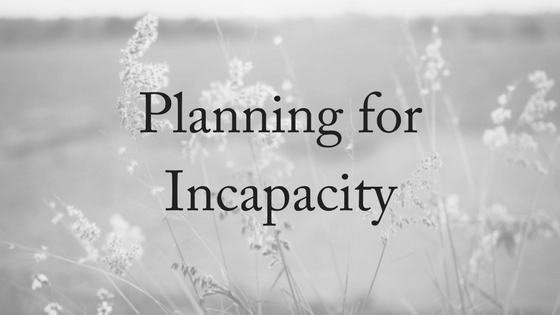We don’t like to talk about the prospect of physical or mental incapacity. At the least, physical and mental incapacity only happens to very old people, right? We would like to believe that we will be completely lucid and with full control of our faculties right up until the moment of our death. The reality is that most of us will have failing bodies and some kind of mental incapacity when we die. We are now living longer than before because of advances in healthcare and technology, but our ability to sustain our bodies and minds is still limited. This why we need to plan for incapacity.
Some Hopeful Statistics
According to the Australian Bureau of Statistics, in 2014, 3.4 million Australians were aged 65 and over and 456,600 people were aged 85 and over. Women accounted for 54% of people aged 65 and over and 65% of people aged 85 and over. The Australian Institute of Health and Welfare positively states that most older Australians are in good health and they have more years free of disability. This is a good thing. They say that, “From 1998 to 2012, there was a clear trend observed in an increasing number of years that were free of disability and severe or profound core limitation. Gains in life expectancy at age 65 were, on average, for more years without severe or profound limitation than years with it. Men who were aged 65 in 2012 gained 2.3 years without and 0.7 years with limitation, while women gained 2.0 years without and 0.3 years with limitation. Overall, Australians are living longer, and they are doing so in better health and with fewer functional restrictions.”
[Tweet “As we age we may keep our health but we will still have a period with limitation.”]
The Reality of Physical & Mental Incapacity
This sounds like great news – and it is. But what we’re most interested in is that there is still some time, usually towards the end of our lives, with limitation. This could mean either physical or mental incapacity or a combination of both. Since 2013 dementia has become the second leading cause of death. It is a chronic illness that affects the brain and its ability to function normally. Chronic illnesses or diseases, rather than acute or infectious diseases, injuries or accidents, cause most deaths in Australia. Most of us will have a significant decline in our health before we die, often affecting our ability to make decisions. This is why we need to make decisions now, planning for our likely physical and mental incapacity later (or for some of us – sooner).
 Unless you have good estate planning in place, your health decisions can be left in limbo which can also leave your family in the same state. If you are incapacitated in any way you may not be able to make decisions regarding your health care or your financial and personal affairs. Who will make decisions for you when you can’t? What kind of end-of-life planning should you do?
Unless you have good estate planning in place, your health decisions can be left in limbo which can also leave your family in the same state. If you are incapacitated in any way you may not be able to make decisions regarding your health care or your financial and personal affairs. Who will make decisions for you when you can’t? What kind of end-of-life planning should you do?
A will is just one part of estate planning. It’s a document that allows you to distribute your estate on your death, according to your wishes. But you need to make those wishes clear now so that there is no doubt that you were of sound mind when you signed your will. If there’s any question about its validity then your will has a greater chance of being contested. There are several documents that demand your attention now so that when you are incapacitated, your voice will still be heard.
The Australian Medical Association of Queensland (AMAQ) is challenging people to tackle it head on and put wishes about end-of-life care on the record, which could cover everything from the level of medical intervention to last drinks. Retiree Greg Rogers, 69, is a perfect candidate for the AMAQ’s new campaign. He leads a healthy and active life, but lately he has been planning for its end. “It’s been one of those ‘gonna do’ things and I’ve been ‘gonna do it’ for a long time and I thought I’ve got to get it done before I turn 70 and so, it’s done,” he said. He filed several documents. His Advance Health Directive lists his current wishes for his final medical care and is a legal document that is designed to be reviewed, so changes can be made if his circumstances or personal views change.
End-of-Life Planning Documents
These are the documents to help make your wishes known. Having a professional help you to fill them out will ensure that you don’t forget anything and that the documents are valid.
- Advance Health Directive – (also referred to as a living will) is a legal document that gives instructions about your future healthcare, appoints a power of attorney and comes into effect when you have
 impaired capacity. In it you can outline your wishes for what kind of medical care and intervention you are comfortable with at the end of your life.
impaired capacity. In it you can outline your wishes for what kind of medical care and intervention you are comfortable with at the end of your life. - Enduring Power of Attorney – a legal document that gives another person the authority to make healthcare and/or financial decision on your behalf when you have impaired capacity. You choose who will be your attorney (or attorneys). It is important you choose someone who is trustworthy and who will have your best interests in mind. It does not have to be a family member.
- Statement of Choices – (also called a Letter of Wishes) lists your wishes, values and beliefs but does not form legal consent
- Will – a legal document that states how you would like your assets distributed when you pass away
If you are a younger person this is still something that you need to do now. It is not just for ‘old people’. None of knows when we may suddenly become incapacitated through illness or accident. Death comes to all ages with or without warning.
[Tweet “End-of-life planning is not just for old people. Death can come without warning.”]
At Estate Battles we are experienced at helping people to think through these end-of-life issues and help them make clear through the appropriate legal documents their end-of-life wishes. Our estate lawyers offer a free, 10-minute phone consultation. Please contact us today for help with your estate planning needs.

